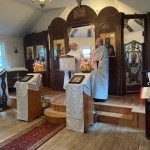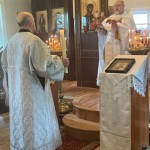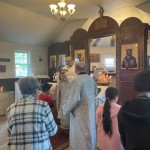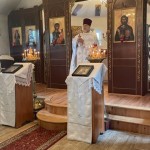On April 23, on the Sunday of Antipascha, also known as Sunday of St. Thomas, we had a nice service at St. George Church. Our Rector, Archpriest Igor Tarasov celebrated the Divine Liturgy in our temple. After the Gospel lesson he preached the following homily:
“Dear brothers and sisters in Christ! Today we celebrate Sunday of St. Thomas which calls us to think about belief in the Resurrection of Christ. It is the second Paschal Sunday. Holy Resurrection will be with us throughout 40 days, until the feast of the Ascension”.
“Pascha is with us, and in these joyful days we greet each other with the words “Christ is risen!” We say these words instead of usual worldly greetings like “Hello” or “Good morning”. That is why I often correct some of you if you forget and continue to say something like “Hello” but remind you, “Not “Hello” but “Christ is risen!”” When we say that greeting, we proclaim our faith that our Lord Jesus Christ was risen from the dead. And when we respond and say, “He is truly risen!” (or “Indeed He is risen!”, depending on our translation), we confirm that faith even more. We say that it is true that Christ was risen from the dead. Proclaiming that His Resurrection is true and did happen, we manifest our belief in the greatest miracle that happened in the human history”.
“Today’s Gospel lesson tells about Holy Apostle Thomas who was not present at the first appearance of the Risen Lord to the Disciples. Thus he did not wish to believe in Christ Resurrection. He required a proof or that. Later, as we read in the Gospel, Jesus appeared again when Thomas was with the other Apostles, and offered him to touch His wounds. Then Thomas became certain and exclaimed, “My Lord and my God!” (Jn. 20, 26-28). Unlike Thomas we tend to believe without any proof. If we really mean what we say when we exclaim, “Christ is risen – He is truly risen!”, we believe without seeing the risen Christ, without having a chance to examine His body, to touch His wounds. If we are really sincere and honest in our words, if we don’t just say it automatically, out of the custom or tradition, we are the blessed ones; we are those of whom Jesus said in today’s Gospel, “Blessed are those who have not seen and yet have believed” (Jn. 20, 29).
“It was not easy to believe in the Resurrection of Christ in the times of the Apostles. There were not too many witnesses. The risen Lord appeared only to His Disciples, to those men and women who were close to Him. Therefore, many other people could say that the Apostles were interested persons, so they spread the word of His Resurrection, spread what we know call the “fake news”. They could say that the Myrrh-bearing women were crazy, so they had some vision of the risen Jesus. And the real opponents of Christ, the Jews, did a good job to hide the Resurrection of Christ. They bribed the warriors who kept a watch near the Lord’s Tomb. They paid them asking to say that the Disciples stole His body away while they slept. The Gospel says that this saying became commonly reported by the Jews until this day (Mt. 28, 12-15).“Until this day”, of course, meant the days of the Apostles, however, it is a firm conviction of all the Jews today. They are very adamant in saying that the body of Jesus was stolen and that Christians declared that He rose from the dead. The Jews reject Christ Resurrection and reject His divinity. They keep spreading the “fake news” that Jesus never rose from the dead”.
“This is why, dear brothers and sisters, when we proclaim to others that Christ is risen, we confess a very important belief, a belief that has no solid proof. There is no scientific evidence that Christ was risen. There is a testimony that He lived and died – it can be found in the writings of some ancient authors. But Resurrection of Christ was described only in the Sacred Scripture, the writings that are not trusted by everyone, only by Christian believers. Thus, we are not unbelieving but believing. Thus, we are blessed”.
“Thomas had doubts but Jesus gave him a chance to reject them. When we doubt, let us look at the world around us. The world around us is filled with the signs of God’s presence, with the footprints of God! Every sunset, every sunrise, every tree, every flower that is blooming at this time of spring, every lake, every blade of grass, every twinkling star – is a footprint of our Creator. The Scripture tells us: “The heavens declare the glory of God; and the firmament shows His handwork” (Ps. 19, 1)”.
“Most of the religions believe in the Creator. But only Christianity believes that God so loved the world and so loved the human kind that He became Man and died for us. Therefore, God has not left us only His footprints. He has revealed Himself to us through His Only-begotten Son who lived among us, who died on the cross and who was risen from the dead. The footprints of the setting and the rising sun may tell us that God exists. But only the nail-prints in the hands of the Savior can tell us that God is Love. Jesus appeared to the Disciples, and to Thomas, showing them the wounds in His hands and side – wounds that were proof of His Resurrection, of His victory over death and evil. But they were also the proof of His love; the proof of His divinity, and the proof of our future blessedness in His Heavenly Kingdom”.
“Therefore, dear brothers and sisters, if we sincerely say “Christ is truly risen!”, we continue the faith of the Disciples of Christ. And we need to keep and to cherish that faith of ours and to resemble the Apostles, to imitate St. Thomas – not in his unbelief, but in his desire to believe. We need to discern the “fake news” about faith and to reject them spreading the true and honest news, the Good News of the Holy Gospel, the true news of the Lord’s Resurrection. And let us ask the Lord to help us in our doubts and our unbelief in order to inherit the Kingdom of Heaven”.
The choir director nicely performed Paschal hymn “In Flesh Thou Didst Fall Asleep” and the Aposticha of Pascha during preparation for Holy Communion.
Since we did not hold a service on Bright Saturday when the Paschal blessed bread, called the Artos is usually distributed, the Rector proclaimed the prayer for the breaking of the Artos following the Ambo prayer.
The Rector made some announcements, especially regarding our Patronal feast of St. George which comes soon.
Finally, the Rector distributed the Artos among the parishioners.




